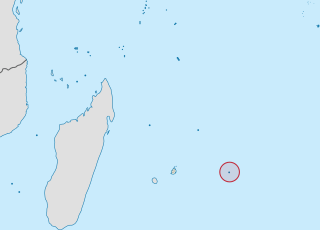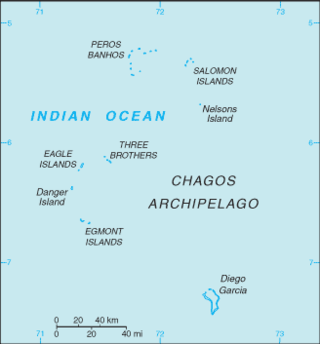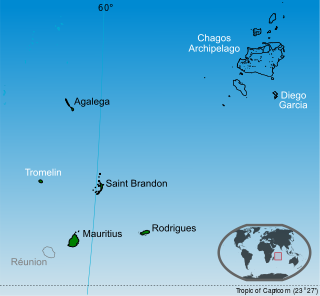
Diego Garcia is the largest island of the Chagos Archipelago, part of the British Indian Ocean Territory (BIOT). It has been used as a joint UK–U.S. military base since the 1970s, following the expulsion of the Chagossians by the UK government. The Chagos Islands have been a British overseas territory, but in early October 2024, the UK agreed to transfer sovereignty of the islands to Mauritius, while allowing the military base to remain under a 99-year lease, pending a treaty ratification.

Mauritius, officially the Republic of Mauritius, is an island country in the Indian Ocean, about 2,000 kilometres off the southeastern coast of East Africa, east of Madagascar. It includes the main island, as well as Rodrigues, Agaléga, and St. Brandon. The islands of Mauritius and Rodrigues, along with nearby Réunion, are part of the Mascarene Islands. The main island of Mauritius, where the population is concentrated, hosts the capital and largest city, Port Louis. The country spans 2,040 square kilometres (790 sq mi) and has an exclusive economic zone covering 2,300,000 square kilometres.

Rodrigues is a 108 km2 (42 sq mi) autonomous outer island of the Republic of Mauritius in the Indian Ocean, about 560 km (350 mi) east of Mauritius. It is part of the Mascarene Islands, which include Mauritius and Réunion. Like Agaléga, Rodrigues is a constituent island of the Republic of Mauritius, under the Constitution of Mauritius and still remains, as explicitly defined by the same Constitution, part of the Sovereignty of Mauritius, together with the following islands: "Agalega, Tromelin, Cargados Carajos, Chagos Archipelago ... Diego Garcia and other islands included in the State of Mauritius".

The Chagos Archipelago or Chagos Islands is a group of seven atolls comprising more than 60 islands in the Indian Ocean about 500 kilometres (310 mi) south of the Maldives archipelago. This chain of islands is the southernmost archipelago of the Chagos–Laccadive Ridge, a long submarine mountain range in the Indian Ocean. In its north are the Salomon Islands, Nelsons Island and Peros Banhos; towards its south-west are the Three Brothers, Eagle Islands, Egmont Islands and Danger Island; southeast of these is Diego Garcia, by far the largest island. All are low-lying atolls, save for a few extremely small instances, set around lagoons.

The Outer Islands of Mauritius is the first-level administrative divisions of the country and consists of the islands of Mauritius and several outlying islands. The Outer Islands of Mauritius are managed under the aegis of the Prime Minister of Mauritius through Prime Minister's Office by the Outer Islands Development Corporation which is the authority empowered under the law to manage the Outer Islands of Mauritius. The Prime Minister is also Minister for Rodrigues, Outer Islands and Territorial Integrity. The Constitution of Mauritius states that the Republic of Mauritius includes the islands of Agaléga, Mauritius, Rodrigues, Saint Brandon, Tromelin Island, and the Chagos Archipelago. The Government of Mauritius claims sovereignty over the Chagos Archipelago, which the United Kingdom split from its territories to create the British Indian Ocean Territory before its independence in 1968. Additionally, France shares a sovereignty claim over Tromelin Island, an uninhabited island between Madagascar and Mauritius's main island.

The Chagossians are an Afro-Asian ethnic group originating from freed African slaves brought to the Chagos Islands, specifically Diego Garcia, Peros Banhos, and the Salomon island chain, in the late 18th century as well as people of Asian descent. Under international law, they are the indigenous people of the Chagos archipelago. Most Chagossians now live in Mauritius, Seychelles, and the United Kingdom after being forcibly removed by the British government in the late 1960s and early 1970s so that Diego Garcia, the island where most Chagossians lived, could serve as the location for a United States military base. Today, no Chagossians are allowed to live on the island of Diego Garcia or anywhere in the Chagos archipelago, despite many of the islands they used to inhabit being over 160 km away from Diego Garcia.

The British Indian Ocean Territory (BIOT) is an archipelago of 55 islands in the Indian Ocean, located south of India. It is situated approximately halfway between Africa and Indonesia. The islands form a semicircular group with an open sea towards the east. The largest, Diego Garcia, is located at the southern extreme end. It measures 60 square kilometres (23 sq mi) and accounts for almost three-quarters of the total land area of the territory. Diego Garcia is the only inhabited island and is home to the joint UK-US naval support facility. Other islands within the archipelago include Danger Island, Three Brothers Islands, Nelson Island, and Peros Banhos, as well as the island groups of the Egmont Islands, Eagle Islands, and the Salomon Islands.

The Internet country code top-level domain (ccTLD) .io is nominally assigned to the British Indian Ocean Territory. The domain is managed by Internet Computer Bureau Ltd, a domain name registry, with registrar services provided by Name.com.
Nelsons Island or Nelson Island or Île Legour is a small uninhabited island in the Great Chagos Bank, of the Chagos Archipelago in the Indian Ocean. As a protected nature reserve, access to the island is strictly restricted.

Sega is one of the major music genres of Mauritius and Réunion. It is a complete performance art, involving music, story-telling and traditional dance. Musically, the most modern forms common in Mauritius are its fusion genre Seggae and bhojpuri variations, whilst in Réunion we find the addition of maloya, the latter being much closer to the older, typical music influences originating from Madagascar. The variety of different sega forms is reflected in the multi-ethnic populous of the indigenous population of Mauritius.
The United Kingdom, at the request of the United States, began expelling the inhabitants of the Chagos Archipelago in 1968, concluding its forced deportations on 27 April 1973 with the expulsion of the remaining Chagossians on the Peros Banhos atoll. The inhabitants, known at the time as the Ilois, are today known as Chagos Islanders or Chagossians.
Mauritian Creoles are the people on the islands of Mauritius, Rodrigues, Agaléga and the Chagos Archipelago and in the wider overseas Mauritian diaspora who trace their roots to continental Africans who were brought to Mauritius under slavery from the seventeenth to the nineteenth century. The majority of these enslaved people came from the region in and around modern day Mozambique and Madagascar. Creole peoples can be found on other islands in the Mascarene Islands and these groups all share cultural and linguistic connections with one another stemming from the common heritage of their African ancestors. It can also refer to and include Christian members of the country's mixed race community. In government records, creoles along with Franco-Mauritians form part of the broader group known as Population Générale.

The British Indian Ocean Territory (BIOT) is an Overseas Territory of the United Kingdom situated in the Indian Ocean, halfway between Tanzania and Indonesia. The territory comprises the seven atolls of the Chagos Archipelago with over 1,000 individual islands, many very small, amounting to a total land area of 60 square kilometres. The largest and most southerly island is Diego Garcia, 27 square kilometres, the site of a Joint Military Facility of the United Kingdom and the United States. Official administration is remote from London, though the local capital is often regarded as being on Diego Garcia.

Colin Roberts is a British diplomat and the former Governor of the Falkland Islands and former Commissioner of the South Georgia and the South Sandwich Islands.

Sovereignty over the Chagos Archipelago was disputed between Mauritius, Maldives and the United Kingdom. Mauritius has repeatedly stated that the Chagos Archipelago is part of its territory and that the United Kingdom claim is a violation of United Nations resolutions banning the dismemberment of colonial territories before independence. On 22 May 2019, the United Nations General Assembly adopted a non-binding resolution declaring that the archipelago was part of Mauritius; 116 countries voted in favour of Mauritius while six opposed it.

The Chagos Marine Protected Area, located in the central Indian Ocean in the British Indian Ocean Territory of the United Kingdom, is one of the world's largest officially designated marine protected areas, and one of the largest protected areas of any type on Earth. It was established by the British government on 1 April 2010 as a massive, contiguous, marine reserve, it encompasses 640,000 square kilometres (250,000 sq mi) of ocean waters, including roughly 70 small islands and seven atolls of the Chagos Archipelago.
Jagdish Dharamchand Koonjul, GCSK, GOSK, is the Permanent Representative of Mauritius to the United Nations, and was President of the United Nations Security Council in January 2002.
Sabrina Jean is a second-generation Chagossian and activist for the Chagossian community to return home to the Chagos Islands in the Indian Ocean, administered as part of the British Indian Ocean Territory.
Sega tambour of Rodrigues Island is one of the types of Sega music of Mauritius, with origins in the Rodrigues Island, a small island about 108 square kilometres (42 sq mi) in area.
Jessy Marcelin is a Chagossian musician and activist who was born in the Chagos Islands and forced to leave as part of Britain's displacement of the Chagossian people.













